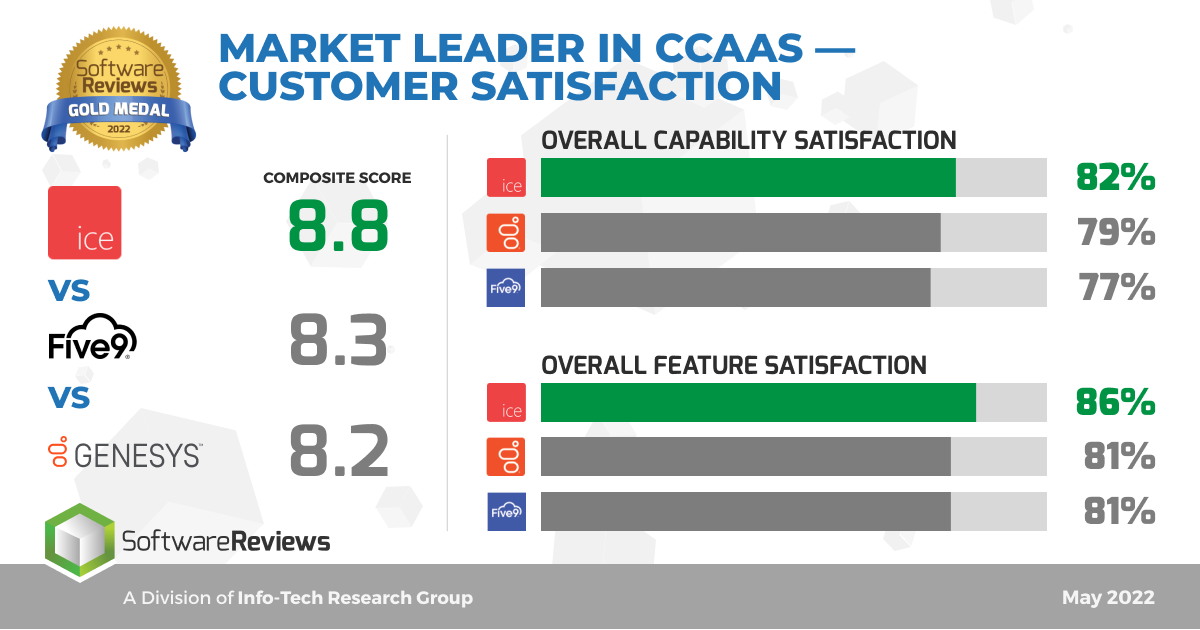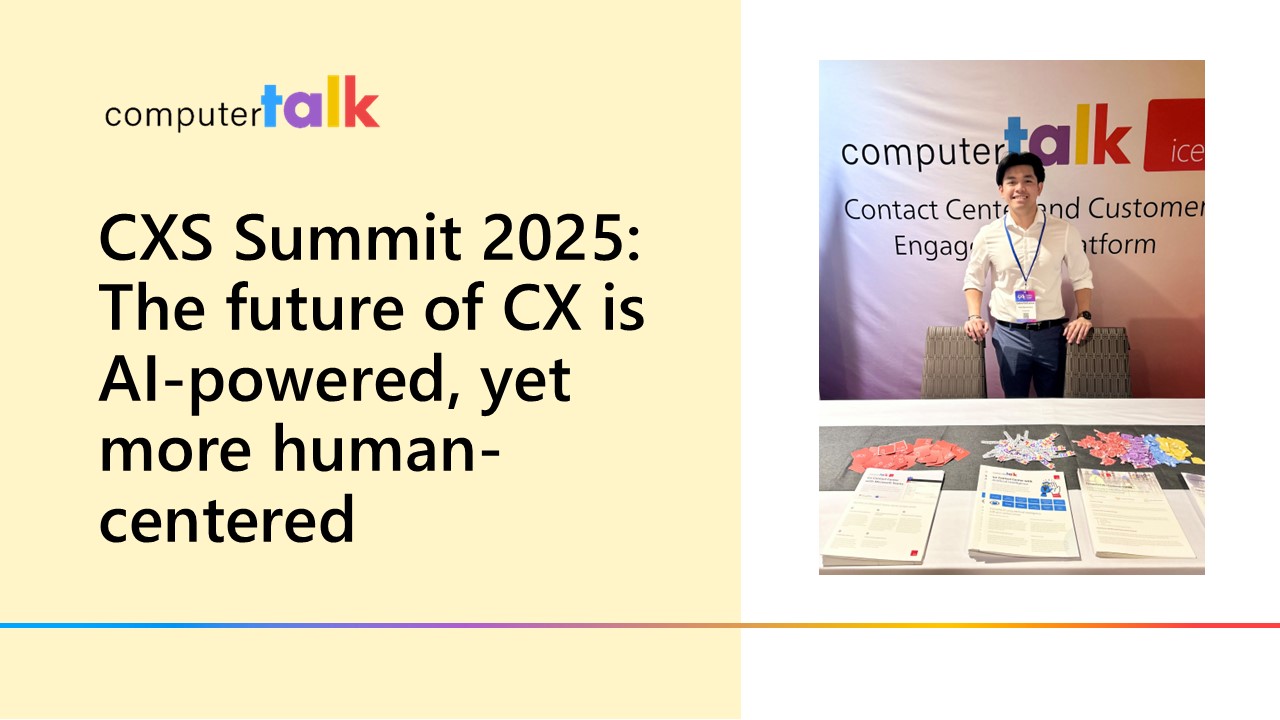Featured
Choosing a Contact Center Vendor: What to Look for in 2025
by Erina Suzuki | Published On January 14, 2025

Knowing how to choose the right contact center vendor is more important than ever in today’s world. It’s not just about staying ahead of technological changes anymore. It’s about adapting to your customer’s ever-evolving expectations and preferences.
Contact centers form the foundation of your relationships with customers, influencing everything from sales conversations to customer service, retention and loyalty.
While there are countless contact center vendors to choose from, they’re not all created equally. Everything from the scalability of your technology, to your ability to take advantage of innovative new technologies like AI and automation will impact your customer’s experience and your bottom line.
In this guide, we’ll cover everything business leaders need to consider when selecting the right contact center vendor, to ensure you can stay one step ahead of the competition and delight your customers in 2025 and beyond.
Understanding Your Business Needs
No two businesses are alike. That means there will never be a one-size-fits-all contact center that’s ideal for every organization. Some companies need to handle thousands of calls a day, while others need to invest in constant outreach to generate and nurture leads. Before you can effectively compare and assess contact center vendors, take a step back and look at your specific requirements. Start by:
- Identifying specific goals: What do you need to accomplish with your contact center, now and in the near future? Are you looking to improve customer satisfaction scores (improve CSAT by 20%), scale operations to meet a 30% increase demand, or reduce operating costs by 20% without compromising service quality?
- Assessing customer interactions: What are your conversations with customers typically like? Do you handle simple inquiries that could benefit from AI-driven automation, or does your business deal with complex, high-stakes cases that require skilled human agents?
- Considering industry essentials: Contact centers in specific industries have unique requirements. In healthcare, you might need tools that allow you to send automatic appointment reminders to customers. In finance, you may need a secure way to handle payments and transactions.
At the same time, it’s worth taking a quick look at your existing technology stack. What does your new contact center solution need to work alongside? Do you already have a solution like Microsoft Teams for internal communication that you also want to use for customer conversations?
Key Features to Look for in a Contact Center Vendor
Once you’ve looked at your specific business needs, it’s time to start thinking about the features that will help you define the best contact center vendor. While the exact features you’ll need will vary depending on your business model, industry, and other factors, some key points to consider include:
Technology and Innovation
Technology, customer expectations, and even business models are constantly evolving. Your chosen contact center vendor needs to have the right approach to innovation, so you can adapt to changing dynamics and trends. For instance, think about the channels you need to use to connect with customers right now. Do you need to take an omnichannel approach, combining voice, with email, chat, social media, and even video conferencing?
AI capabilities are another must-have. Tools like chatbots for instant responses and sentiment analysis to gauge customer emotions can significantly improve response times and operational efficiency. IBM even found that chatbots can handle up to 80% of requests and reduce service costs by 30% . You may even want to invest in AI to help you with internal analytics, and agent assistance.
Beyond that, make sure your chosen contact center vendor offers technology that’s flexible enough to connect with your existing software. Integrations with your CRM platform, like Salesforce or Microsoft Dynamics, are particularly important. They’ll ensure agents can access customer information instantly, reducing resolution times and improving satisfaction.
Scalability and Flexibility
Growth and change are inevitable for all contact centers. Your contact center needs to flex and adapt to support your business as it evolves. Growth is inevitable, and your contact center solution must grow with you. A scalable vendor ensures seamless support for seasonal surges in demand or rapid expansion into new markets. For example, a retailer might see a spike in activity during the holiday season, which means they need the ability to quickly add agent seats or channels without service disruption.
Flexibility is equally critical. As businesses evolve, so do their customer service needs. Your vendor should offer solutions that can adapt to changing requirements, such as adding new communication channels, integrating with emerging tools (like AI assistants), or adding new features.
Vendors with pay-as-you-go pricing (where you pay for the specific tools and services you use),or modular features (like add-on chatbots and analytical tools) are ideal for managing costs without sacrificing functionality. Whether scaling up or pivoting to new priorities, a flexible vendor ensures your contact center remains a strategic asset, not a bottleneck.
Security and Compliance
Contact center security issues are evolving, particularly in the age of AI, and deepfakes. As security threats evolve, customers demand greater assurances about how their data is handled. That makes it essential to consider security and compliance.
Look at each contact center vendor’s approach to adhering to data protection regulations like GDPR or CCPA to safeguard customer information. Consider how they address specific industry needs. For instance, for companies taking payments over the phone, ComputerTalk offers a PCI-compliant payment system.
Security certifications, such as ISO 27001, demonstrate that a vendor has rigorous protocols to protect sensitive data. Look for robust features like end-to-end encryption, secure authentication processes, and regular audits to ensure compliance with global standards.
Customization Options
As mentioned above, every business has specific needs when it comes to contact center operations, so it’s worth ensuring you can tailor your chosen contact center to your requirements. Customizable solutions that allow you to create your own automated workflows, IVR flows, outbound calling policies, and security strategies (like multi-factor authentication) are crucial.
For example, a healthcare provider might need integrations with industry-specific tools or HIPAA-compliant configurations, while an e-commerce company might prioritize advanced analytics and real-time reporting dashboards.
Customization also extends to user experience. Being able to configure agent interfaces or tweak automated workflows ensures the technology works for your team, not the other way around. By choosing a vendor that values adaptability, you ensure their solution feels less like a generic tool and more like an integral part of your business strategy.
Pricing Models and Cost Considerations
Budget will always be a consideration for any company investing in new technology. The key to success isn’t just choosing the “cheapest” contact center but finding a solution that delivers the most value or “Return on Investment” by helping to improve efficiency, customer retention rates, and performance. The first thing you’ll need to think about is the pricing structure your vendor offers.
Common options include:
- Pay-Per-Use: Charges are based on actual usage, such as per-minute rates for voice calls or per-interaction fees for other channels. This model offers flexibility but can lead to unpredictable costs during high-usage periods.
- Subscription-Based: Involves a fixed monthly or annual fee per user or agent seat, often encompassing a set of features and support levels. This approach provides cost predictability and is common among cloud-based contact center solutions.
- Flat Fees: A single, all-inclusive rate covering all services and features. While straightforward, it may not offer the flexibility to scale services up or down based on changing needs.
Next, think about the additional “hidden” costs that might come into play. Read this blog to find out the 9 questions to ask a vendor to avoid hidden fees. Some vendors charge setup and implementation fees, particularly for companies with specific needs. They may even charge you extra for custom integrations, or ongoing support and maintenance. If your chosen solution is complex, you may need to account for the costs of training your team members too.
Think carefully about the “total cost of ownership” for your system. A contact center that may have a higher monthly subscription cost could actually offer better value if it also delivers excellent feature alignment, scalability, and ease of use. Alternatively, a contact center with a low-cost pay-as-you-go model might be less cost-effective if you need to combine a lot of features.
Vendor Reputation and Experience
Over 95% of customers read reviews before making a purchase. When you’re investing in something as crucial as the right contact center, you should be evaluating your vendor’s reputation too. Do your research. Check their website and online assets to find out if they have a proven track record working with companies in your industry, or firms with your specific needs.
Read case studies and testimonials, both on the vendor’s website, and from third-party sources. Vendors that can showcase successful partnerships with businesses like yours demonstrate their ability to drive results. For example, look for detailed accounts of how they helped improve key metrics such as customer satisfaction (CSAT) scores, average handling time, or first-call resolution rates.
Awards, certifications, and recognitions also reflect a vendor’s credibility. Look for accolades from trusted industry organizations or certifications like ISO 27001 for security or SOC 2 for data management. These achievements show their commitment to excellence and adherence to industry standards.
Customer Support and Service Level Agreements (SLAs)
Eventually, you’re going to need support from your contact center vendor, so make sure they’re committed to giving you the guidance and assistance you need. When your system experiences downtime or an issue arises, you need assurance that the vendor’s support team is available and responsive. Look for vendors offering 24/7 support with multiple communication channels, such as phone, email, and live chat.
Consider your vendor’s approach to guaranteeing customer success. Do they commit to proactive engagement, such as regular health checks, performance optimization, and personalized training sessions for your team? Vendors that prioritize customer success go beyond solving problems—they actively help you maximize the value of their solution.
Service Level Agreement (SLA) terms are worth considering too. Does your vendor promise specific uptime guarantees, such as 99.99% availability? How quickly do they promise to resolve technical issues and potential concerns your company might have?
Onboarding and Transition Process
Speaking of exceptional customer service, consider how your vendor actually handles the onboarding and transition process. How easy do they make it to migrate from an existing contact center platform into a new one, and integrate your solution with existing tools?
Think about how your vendor helps to minimize downtime and disruptions due to the migration process. Vendors experienced in handling transitions will use strategies like phased rollouts, ensuring legacy systems remain operational while you’re moving to your new system. Test environments and pilot runs can also help identify potential issues before full deployment.
Additionally, look at your vendor’s onboarding strategy. Check for educational resources and help centers on the company’s website and consider how they commit to simplifying the adoption process. For instance, ComputerTalk delivers customized training and support services, technical guidance, and a range of unique professional services.
Evaluation Process: Questions to Ask Potential Vendors
While doing your own research can help you make the right choice when comparing contact center vendors, few things will give you the same insight as actually talking to your vendor. Arrange a meeting, and prepare to ask questions about:
Scalability: Can the vendor scale with your business growth? Ask about their capacity to handle increased call volumes, add new communication channels, or support expansion into new markets. Do they have any examples of companies they’ve helped scale before?
- Security and Compliance: What is their approach to handling security and compliance? Inquire about certifications like ISO 27001 or SOC 2 and their adherence to regulations like GDPR or CCPA. Ask about encryption, authentication protocols, and how they ensure data protection.
- Cost Transparency: What is included in the cost, and are there any additional fees? Clarify whether the quoted price covers implementation, training, integrations, and ongoing support. Make sure you know exactly what you’re paying for.
- Issue Resolution: How do they handle customer complaints or technical issues? Assess their support structure, response times, and escalation processes.
Red Flags to Watch Out For
Finally, since choosing a new contact center vendor has a significant impact on your company’s long-term success, it’s important to know the red flags you should be looking for too. When you’re comparing your options, watch out for:
- Lack of transparency: If a vendor is vague about costs or unwilling to break down their pricing structure, that’s not a good sign. Hidden fees for setup, training, integrations, or support can have a huge impact on your budget. Make sure your vendor is transparent.
- Poor reviews and unresolved complaints: Even the best contact center vendors can get a few negative reviews. However, if the feedback your vendor gets is overwhelmingly poor, or you notice they don’t respond to or deal with complaints, that’s a red flag.
- Limited or outdated technology and infrastructure: Contact center vendors need to keep up with the latest evolutions in the industry. Watch out for companies that lack solutions for omnichannel communications, AI, or seamless integrations with existing tools.
Additionally, be wary of any contact center vendor that simply refuses to provide references, testimonials, or case studies. This could indicate they don’t have enough experience to support a company like yours, or that they’re not confident in their reputation.
Choosing the Right Partner for CX Success
Choosing the right contact center vendor in 2025 isn’t just a technical decision – it’s a choice that will impact the future growth and sustainability of your company. You’re not just looking for a provider, you’re searching for a partner that will help you overcome challenges and reach your goals.
Comprehensive research, meticulous planning, and clear communication are crucial to making the right choice. Evaluate multiple vendors, ask them targeted questions, and consider which vendor can truly deliver the long-term solution you need to excel in customer experience.
Want to discover if ComputerTalk could be the ideal contact center vendor for your needs? Schedule a free consultation with our team. We’ll be happy to answer all the questions you might have, so you can make the best decision for both your current and future requirements.
More from our blog
 Microsoft recently announced Microsoft Teams Phone extensibility at Enterprise Connect. ComputerTalk is excited to work with Microsoft on another early adopter project, continuing our commitment to innovation and seamless integration within the Microsoft ecosystem.
Microsoft recently announced Microsoft Teams Phone extensibility at Enterprise Connect. ComputerTalk is excited to work with Microsoft on another early adopter project, continuing our commitment to innovation and seamless integration within the Microsoft ecosystem.
 Last month, we shared on our blog that ComputerTalk’s ice Contact Center achieved the highest level of customer satisfaction in Info-Tech research Group's SoftwareReviews. We outperformed competitors, like Genesys and Five9, both in capability and feature satisfaction, as well as...
Last month, we shared on our blog that ComputerTalk’s ice Contact Center achieved the highest level of customer satisfaction in Info-Tech research Group's SoftwareReviews. We outperformed competitors, like Genesys and Five9, both in capability and feature satisfaction, as well as...
 The CXS Summit 2025 was both exciting and eye-opening. As someone still early in my career and new to the CX industry, I went in hoping to better understand the greatest challenges organizations are facing in CX. What I took...
The CXS Summit 2025 was both exciting and eye-opening. As someone still early in my career and new to the CX industry, I went in hoping to better understand the greatest challenges organizations are facing in CX. What I took...

